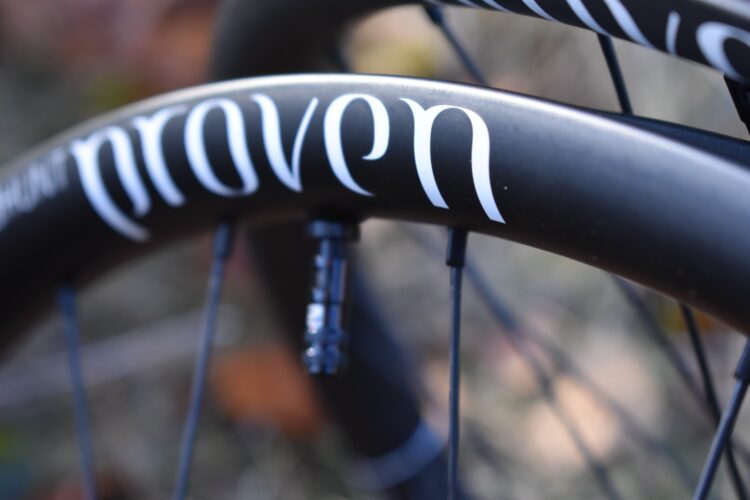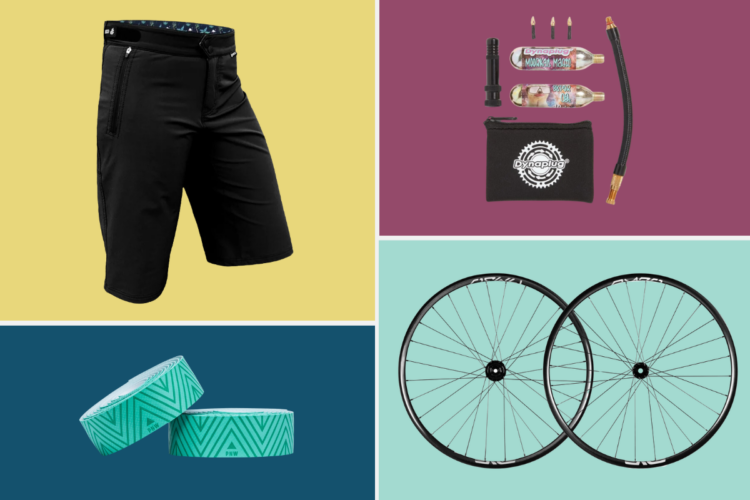
Carbon fiber wheelsets have been around for quite some time. Companies have attempted to differentiate their wheels from the competition by offering a new type of carbon layout, hookless bead, moto-style compliance, or claims of near indestructibility. If you want light weight you sacrifice material strength, and if you want a super tough wheelset then you sacrifice weight. Ride feel is super important too.
In comes Berd, a company reinventing the bicycle wheel…. sort of. Berd came up with the grand idea to make spokes out of an advanced polymer called Ultra High Molecular Weight Polyethylene (UHMWPE). Yup, you heard that right, a spoke made out of polymer rather than steel or carbon like we have seen other companies use for many years. Berd claims that UHMWPE has 12 times the strength-to-weight ratio of steel. If you are in disbelief like I was initially, let me tell you my thoughts on this new wheel technology.
Berd HAWK30 wheel specs
- 28 spokes front and rear
- Price: From $2,095 for the wheelset; $8 per replacement spoke
- Buy from berdspokes.com
I got a chance to give the Berd Hawk30 Carbon Wheelset a few rides. This specific model was created in partnership between Berd and We Are One Composites. We Are One Composites is a company that designs, engineers, machines, tests and manufactures carbon bikes and wheels in-house. The Hawk30 Carbon rims are made by We Are One Composite and the spoke technology are made by Berd of course. My sample wheelset came with Industry Nine Torch Hubs to top things off but you can also choose to get Berd’s own Talon hubs or fancy Onyx hubs.
Berd spokes


Why on earth would spokes made out of a polymer rather than steel or carbon be more beneficial, I asked myself. Apparently there’s some good science behind this idea. The material properties of the spoke polymer damp vibrations 200% better than wheels with metal spokes.
I noticed the difference on my first ride. It made the ride more comfortable and smooth, especially on fast, chattery trails. On bigger impacts the spokes distribute the energy well across all 28 spokes front and rear. The wheel’s almost-muted feel took some getting used to but after a few laps, my arms and hands were definitely happy

In addition, Berd Spokes have an excellent torque fatigue performance for pedaling and heavy braking. This holds true as I boosted on my ebike at 60nm through many climbs and they endured my weight and the e-bike’s weight (about 270lbs total) on long descents without a hiccup.
I’ve broken a couple of metal spokes in other wheelsets in the past and I was worried that Berd spokes could be more susceptible to impacts. Though I did not purposefully try to break the spokes, Berd did testing of their own, sticking a metal rod through the spokes of two high spinning wheels. The one with Berd spokes absorbed the impact and no damage was done at all. On the other hand, the non-Berd, metal-spoked wheel sustained permanent damage on a spoke and the rim. From the looks of it, Berd spokes are tough and should keep riders worry free.
In addition to the black spokes on my sample wheelset, Berd also offers spokes in a white shoe-lace look. These can even be painted for a truly one-of-a-kind look.



The Carbon Rims
You’d think that with these noodle-like spokes, the whole wheelset might feel wobbly or even flexy. It’s interesting how stiff the wheelset feels right out of the box. The carbon rims really do a good job at keeping the wheels predictable and responsive especially at those faster speeds. The rims stay well composed even on the chunky parts of the trails thanks to their excellent radial compliance. The 30mm internal width and 18mm rim depth deliver consistent lateral stiffness and give my Maxxis Exo+ tires a great tire profile.
I’ve ridden full alloy Trail/Enduro wheels, heavy duty eMTB-specific alloy wheels, and XC/Trail carbon wheels with alloy spokes, and these Berd Hawk 30’s feel like all of those wheels combined.


I didn’t have any issues with the wheels during my tests. I read that there is a six-month bedding-in period for these wheels and that over time the spokes may lose about thirty percent of that out-of-factory tension. So far the wheels feel just as good as the first ride, though I haven’t had them for a full six months.
I am not a wheel builder nor a trained bike mechanic, so if I need any wheel fixes, I head straight to my LBS. Unfortunately Berd wheels have a bit of a learning curve and must be worked on by a trained mechanic that understands the Berd Installation guide and has the right tools. So far I found two somewhat nearby shops and two distant shops that could help me if I ever need these Berd wheels worked on. All are a bit of a drive but I’m crossing my fingers that more shops nearby will start to carry these wheels or can work on them.


Ride and Feel
The Berd HAWK30 carbon wheels were tested on my 45-pound, mid-sized e-bike with a 60nm torque motor. Yes, Berd spokes can be used as a replacement for 14-gauge metal spokes for those who are wondering (I had to dig a bit on their frequently asked questions). However I wasn’t too worried because my bike isn’t a full sized e-bike. These Berd Hawk30 wheels are ideal for any analog, lightweight, or mid-weight electric mountain bike.
I tested the wheels on eco, mid, and boost power. The wheels kept up with all the torque the motor put in. Even when I was out of the saddle on tough and rooty technical climbs, all the pedaling power transferred over to the tires giving fast and consistent grip.
Berd says they have tested the HAWK30 wheels at up to 250nm of torque. I’ve had my e-bike for a couple of years now and I’m well tuned to small changes in ride feel. I did notice how much snappier these wheels are compared to my previous enduro/e-bike alloy wheels. The 1,394g weight certainly helps.


I’m sure analog mountain bike riders will notice great climbing characteristics more than e-bike riders. But of course these wheels shine on the downhill too. I took them to some local trails that I’ve ridden for many years and I immediately noticed how well they damp vibrations. So much of the fast trail chatter was gone. Don’t get me wrong, I could feel every bit of the trail as I remembered it, it’s just that the vibrations never quite made it to my hands and feet. The best way I can describe the feeling is that it’s like wearing noise canceling headphones where most of the unnecessary noise/vibrations gets taken out. The feeling is both odd and satisfying at the same time.
The front wheel feels precise while steering and the rear tracks excellently. Small jumps and bad lines were no problem for these wheels. They just come to life at those higher speeds and keep riding predictable even on quick, tight turns.
Pros and cons of the Berd HAWK30 carbon wheels
Pros
- Excellent vibration damping
- Lightweight for its class
- eMTB capable
Cons
- Not very home mechanic friendly
- Slow growing list of shops that can work on Berd wheels in my area

Bottom line
The Berd HAWK30 wheels are unique, top-shelf components and have a high price tag to go along with them. These carbon wheels are for aggressive trail mountain bikers who want a lightweight and tough carbon wheelset that will damp hand-rattling vibrations out on the trails. You really do get what you paid for.
I expect to see Berd wheels on more bikes in the future as more riders find out about the benefits of their technology. The only downside I can see at the moment is not having more knowledgeable mechanics who can work on Berd wheels. If the price seems a bit steep, remember you are getting parts from various wheel companies like We Are One Composites that excel at what they do.



















